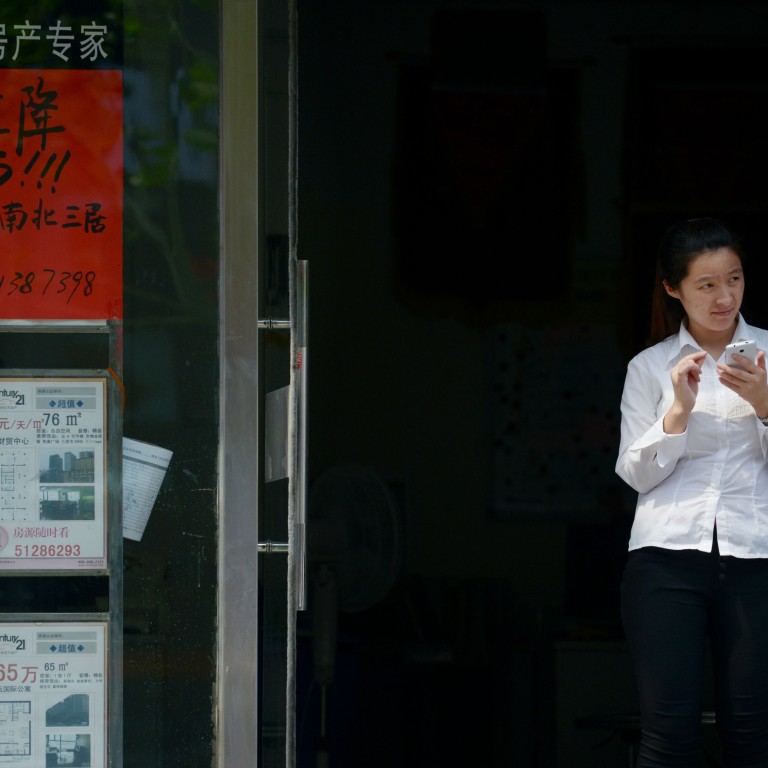
Developers’ cash flow hit by delays in home loan approvals
Lengthy approval times for loans are a nightmare for buyers eager to move into new homes and developers waiting for their money
In November, Hu Qiang bought a 90 square metre flat in the outskirts of Nanjing, Jiangsu province, for one million yuan (HK$1.26 million) and immediately applied for a mortgage.
Hu knew that getting a housing loan takes time, but he never expected it to be such a long process.
It is now seven months since Hu made a 30 per cent down payment on his flat, and he sees no sign of his loan being approved soon, as banks tighten their lending policies.
"It looks like many homebuyers have the same difficulty," Hu said.
"I think developers are more anxious than I am, since they won't get the outstanding 70 per cent of sales proceeds until banks approve the mortgages."
The delays in mortgage approvals are proving to be a nightmare to highly geared small developers as cash flows dry up.
Alfred Lau, a property analyst at Bocom International, said developers' cash flow is expected to drop by 10 to 15 per cent, which can aggravate the difficulties of small firms struggling to repay debts and meet operating costs.
Chun Chang, land development manager at China Merchants Property (Nanjing), a subsidiary of China Merchants Land, said the collection of property sales proceeds from banks has been affected by the slow pace of home loan approvals.
Buyers must make a down payment of 30 per cent for a first home, and 70 per cent for a second or subsequent home.
In Nanjing, Chun said, about 20 per cent of sales proceeds are still being held up by banks.
"Our [cash collection] situation is better than that of our rivals in the industry," he said. "We have no choice, as it is the policy. We will give more time for our customers to complete the transactions."
A developer who asked not to be named said it takes about three to five months for banks to release the sales proceeds now, compared with one to two months previously.
It is pouring salt into the wound, as we are already hit by a [sales] slowdown
"It is pouring salt into the wound, as we are already hit by a slowdown in property sales," he said.
The People's Bank of China has cut the reserve requirement ratio for selected banks and lenders in the past two months, leaving them with more cash to lend out, and it has also urged banks to speed up the approval of mortgages to first-time buyers.
However, analysts said it had yet to be seen how much money will flow to the property sector and whether the central bank would reduce the reserve requirement ratio for all banks or cut interest rates in the next few months.
From Monday, a 0.5 percentage point reduction in the ratio will apply to two-thirds of municipal commercial banks, most rural banks, car financing companies and financial leasing firms. The cut is aimed at supporting small businesses, rural economies and consumption.
"The selective RRR cuts will affect market expectations and boost confidence," said Zhao Baogen, an analyst at property agency Shanghai Deovolente Realty.
Bei Fu, a senior property analyst at global rating agency Standard & Poor's, said the cash collection ratio was not easy to track. She was referring to the proportion of total sales proceeds actually received by developers, usually calculated annually.
"We know the general trend must be weakening from last year," Bei said, estimating the ratio for top developers to have fallen to 80 per cent or even lower from 85 to 90 per cent last year.
"Mortgage loans have become more or less a bottleneck for property sales this year," she said.
Lau estimated that listed mainland developers could collect only three months' worth of the outstanding sales proceeds in the first half of the year.
A 10 per cent deferral in collection of sales proceeds could represent five billion yuan for a big developer with 50 billion yuan in sales in the first half, he said.
Major developers are already suffering a decline in sales.
Sales of new homes in this year's first four months fell 8.6 per cent year on year to 1.45 trillion yuan, and total floor space transacted dropped 9.7 per cent to 245 million square metres, National Bureau of Statistics data shows.
Some developers have been forced to cut prices by 20-30 per cent to shore up buying interest.
Alan Jin, an analyst at Mizuho Securities, said small developers have suffered the most.
"Small developers have less room to manoeuvre in a down market and would be hit harder, as they are subordinate clients for banks when compared with big players," Jin said.
"Also, less diversification means slow sales in one or two projects could totally change a firm's cash position."
Tight and more expensive credit is the main cause of the "sudden" slowdown in the market this year, he said.
"Many think there's no policy changes this time around, and then conclude that the slowdown is different this time," Jin said.
"But the key factor behind the slowdown is pretty much the same as in 2011 - tight credit."
As to why buyers of first homes like Hu Qiang are finding it harder to get loans, Jin said, "From the banks' point of view, buyers of second homes are much safer, as the higher down payment required provides a higher buffer for price declines."
This is the first of two parts on developers face cash flow strain amid credit tightening. In Part 2 tomorrow we look at property agents.


